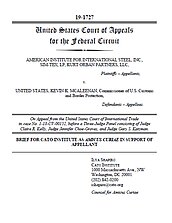Learn more about Cato’s Amicus Briefs Program.
Although the Constitution assigns regulatory power over foreign commerce to Congress, the Trade Expansion Act of 1962 delegates this function to the president. As made obvious by its title, the purpose of this law is to grow foreign commerce by opening trade. Alas one provision—Section 232—works to diminish international trade by empowering the president to unilaterally regulate imports in the interest of “national security.” When Congress passed Section 232, lawmakers were worried about the possibility that a disruption in the global oil trade might constrain the military’s supply of jet fuel. Accordingly, presidential exercises of Section 232, while rare, always targeted oil imports.
In March of 2018, President Trump smashed the mold and instituted a 25 percent tariff on imported steel products. “Flimsy” is a gross understatement in describing the president’s putative “national security” justification: military requirements for steel represent only three percent of the commodity’s domestic production. Indeed, the United States produces twice as much steel as it imports. More troubling is that the president made no effort to explain why he departed from his predecessors’ practice, which uniformly had accounted for the allied status of countries potentially subject to Section 232. Perhaps most disconcerting of all, President Trump offered no explanation for why he chose to set the tariffs at an even 25 percent and how this figure relates to the “national security.”
Faced with these unprecedented and unreasonable regulations, the American Institute for International Steel (a trade group of steel-consuming companies) and other parties harmed by the tariffs filed suit in the Court of International Trade (“CIT”). They alleged that Section 232 is an unconstitutional delegation of lawmaking power because it allows the president to merely cite “national security” and thereby to regulate imports in any manner.
The CIT conceded the dangers of unbound executive authority, yet refused to provide a constitutional check. According to that court, Section 232 regulation falls into “a gray area where the President could invoke the statute to act in a manner constitutionally reserved for Congress but not objectively outside the President’s statutory authority, and the scope of review would preclude the uncovering of such a truth.”
After the CIT sided with the government, the plaintiffs sought to take the case directly to the Supreme Court, and Cato filed a brief supporting them. Because the Supreme Court denied that petition, their case is now before the U.S. Court of Appeals for the Federal Circuit. Cato has again filed a brief supporting these challengers to the existing legal regime.
We argue that the CIT is wrong in allowing for regulatory “gray areas” where the president may act within the statute but outside the Constitution. In fact, the CIT mistakenly assumed that federal courts may not conduct any oversight of the president’s regulatory powers over international trade. To the contrary, if courts can’t review such actions, then Congress violated the non-delegation principle by giving the president legislative powers that are beyond review. But if courts can review the president’s regulatory powers, then President Trump’s arbitrary steel tariffs have to fail judicial scrutiny.

This work is licensed under a Creative Commons Attribution-NonCommercial-ShareAlike 4.0 International License.


